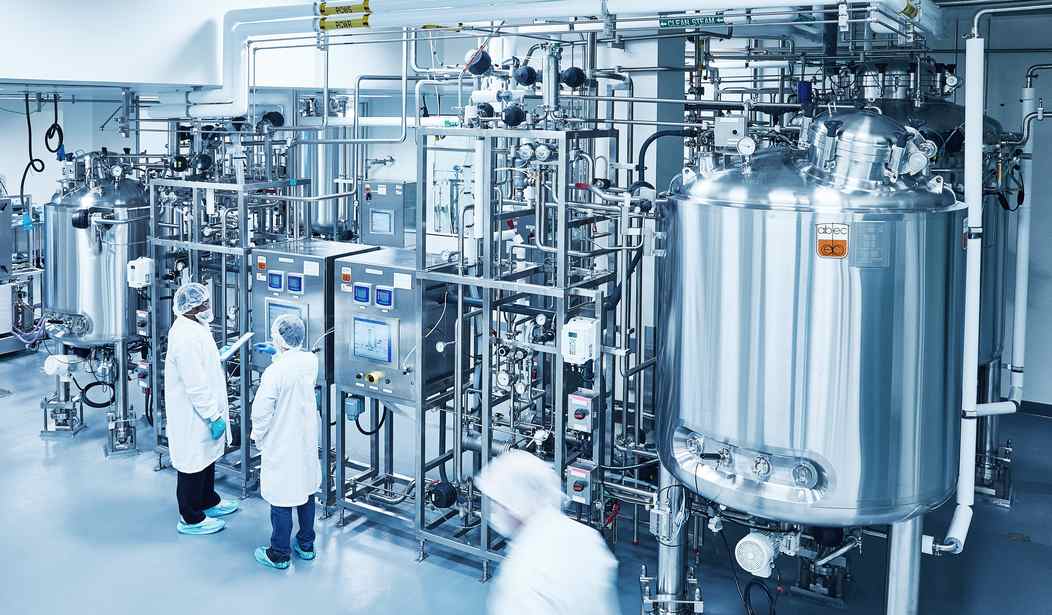The USDA followed in the FDA's footsteps on June 21 by approving the sale of lab-grown meat to American consumers. GOOD Meat, a company that cultivates cell-based meat products, made the announcement.
As guinea pigs of nutritional science, Americans will join Singapore as the only country with the stamp of approval for "cell-cultured" meat. For now, only chicken has passed the same supposedly rigorous approval process of gaining a 'no questions' letter that grants permission for use. Pork and beef will have to wait.
However, you won't be finding cell-cultured meat next to the slaughtered poultry in the protein aisle just yet. Upside Foods and Good Meat, both California-based companies, will first be distributing their product in two restaurants: Bar Crenn, a Michelin-starred restaurant in San Francisco, and celebrity chef José Andrés' restaurant China Chilcano in Washington, D.C.
According to Upside Foods COO Amy Chen in the Scientific American, once the product hits supermarket shelves it's expected to bare the regular round-shaped USDA inspection label. What (hardly) differentiates the cultivated meat from conventional meat is the prefix "cell-cultured" written on the tag.
The creators of manmade chicken claim the process will emit 92 percent fewer carbon emissions and use 95 percent less land. How many farmers and workers of this land will be displaced by a partially automated cell-culture tank is yet to be seen, but for now the product still remains entirely in research facilities. The mass production of this meat could come from their "cell bank" which they say immortalizes the best cells painlessly extracted from live chickens or eggs and can be divided and produced indefinitely. Separate from the initial cells drawn, these immortal cells have their own unanswered questions (Daily Caller):
Recommended
Despite leading scientists generally agreeing that lab grown meat is safe to eat, no long-term studies have been conducted to reliably demonstrate this, Bloomberg reported Tuesday.
Lab-grown meat is often made using immortalized cell lines, which, unlike regular cells, are capable of continuously dividing and growing in a manner similar to cancer cells, according to Bloomberg. Companies developing lab-grown meats have largely remained silent about the connection between their product and cancer cells, possibly in a bid to keep consumers from getting skittish about their products.
Although vegetarians are weary to say this fits their diet, it does satisfy a select portion of plant eaters waiting for meat to come to their plates cruelty-free. Because they are not slaughtering real animals, there's no risk of fecal contamination or pathogens like E. coli.
The process to create the franken-meat occurs in a bioreactor over a four-to-six-week period, where they keep it warm and immerse it in nutrients that would normally go into feeding chickens. When the raw product first finishes, before being mixed with co-ingredients for stability, it has the appearance of minced chicken, a GOOD Meat spokesperson told Townhall. It then goes through a process including scaffolding, 3-D printing, extrusion, and molding in order to make it look and feel edible.
The University of California, Davis Department of Food Science did a study on the environmental impacts of lab-grown meat and found its environmental effects to be far more substantial than its natural counterpart. Purified growth media, the ingredients used to multiply animal cells, was found to have wide-ranging global warming potential, between four and 25 times the impact of conventional beef production.
The study's lead author, doctoral graduate Derrick Risner, said, “If this product continues to be produced using the 'pharma' approach, it’s going to be worse for the environment and more expensive than conventional beef production.”
A Good Meat spokesperson confirmed that the production process is pricey, saying, "Bioreactors and the supporting infrastructure required to produce cultivated meat are not inexpensive to design, build and operate." However, the spokesperson compared the technology to computers, cell phones, and other products, stating, "Those costs will drop over time."
Before that price can drop, the company still has a few hurdles to jump. Their spokesperson says they are focused on tackling key technical and engineering challenges including increasing cell density, designing larger-scale vessels (up to 250,000-liter capacity) and creating more affordable and efficient nutrients to feed the cells. Risner told Townhall the industry would also benefit from the development of a supply chain for amino acids that goes far beyond current manufacturing volumes.
"It will take a significant amount of time to reach mass commercial production," a Good Meat spokesperson said.
Once cell-cultured meat does hit mass production, they believe selling it won't be difficult once public awareness of the product increases. The spokesperson referenced the dishes that have been sold in Singapore, ranging from crispy strips and curries to skewers and salads, fare that received universally high marks from diners since gaining regulatory approval there in late 2020.
At China Chilcano, Good Meat "Anticuchos de Pollo" will initially be available the week of July 31 as part of an exclusive tasting menu, which will be $70/person, by reservation only, and available in very limited quantities.

























Join the conversation as a VIP Member